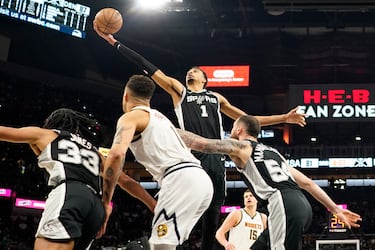NBA rookie wage scale explained: How much money do first year players make?
So, you’ve heard the term “rookie scale salary” but you’re not sure what it means or how it works. Don’t worry, we’ve got you covered with the breakdown.


Though it’s fair to say that players in the NBA are well paid, you might be surprised to know that there is a vast difference between what rookies make and the established stars of the league. Here’s a look at how it all works.
What’s the minimum rookie contract?
Unlike first-round draft choices, any other rookie entering the NBA must negotiate their salary with the team that’s about to acquire them. As you can imagine, this is where the Collective Bargaining Agreement (CBA) comes into play, which demands that the NBA’s minimum rookie salary is a specific percentage of the salary cap.
The CBA, however, dictates that the NBA rookie minimum salary is a certain percentage of the salary cap. For the 2022-23 season, that amount was set at $953,000. What that means, is that any rookie on a team throughout the season is guaranteed that amount, with the salary being prorated if the player is added at a later time in the year on the minimum.
Now, for the 2025-26 season, the number has raised to $1.27 million, exceeding the one million dollar mark.
I am curious how many of the #NBA vets would be okay with the next CBA doing away with the NBA rookie salary scale so that the young guys can secure the 💰on their first contract.
— Derrick Whittington (@DWhitti) February 22, 2019
It’s worth noting that the NBA actually incentivizes teams to sign veterans as well as rookies. This is achieved by creating a situation wherein any one-year veteran’s minimum cap hit maxes out at just over $1.6 million against the cap. This is true even though the salary for a 10 or more-year vet is beyond $3.6 million. The result of this as one can plainly see is that the league is non inundated with rookies on short/cheap deals.
How do NBA rookie contracts work?
In principle, NBA rookie contracts are standard four-year deals that are offered to first-round picks in the NBA Draft. To be clear, the selecting team retains an option to keep the player for years three and four. Naturally, the rookie salary is set according to the overall salary cap, with the player(s) receiving a salary that is also relative to their Draft slot.
Interestingly, the value of the contract may come in at anywhere from 80% to 120% of their slot amount. Where second-round picks and free agents are concerned, it should be mentioned that they receive deals of differing lengths.
What about rookie contract extensions?
Last but not least, we’ve got rookie extensions. In normal circumstances, an extension adds four years to the original rookie contract. Incidentally, the deal can only be signed in the fourth year of the rookie deal, meaning any player who signs one will - unless traded - then be tied to his team for an additional five years.

On the other hand, there is another way in which teams can maintain a rookie for an extra fifth year, and that’s to make a qualifying offer while making the player a restricted free agent. In such a scenario, the player in question receives a one-year deal based on his previous salary.
As you can imagine, this allows for the player’s current team to match any offer coming from one that wants to sign him.
Related stories
Get your game on! Whether you’re into NFL touchdowns, NBA buzzer-beaters, world-class soccer goals, or MLB home runs, our app has it all.
Dive into live coverage, expert insights, breaking news, exclusive videos, and more – plus, stay updated on the latest in current affairs and entertainment. Download now for all-access coverage, right at your fingertips – anytime, anywhere.
Complete your personal details to comment